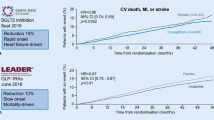Summary
The early and differentiated optimization of glucose level is essential for the improvement of the cardiovascular outcome. In all stages of cardiac disease, the primary goal is to reach near-normoglycemia. The DIGAMI-1 and 2 studies as well as the Munich Myocardial Infarction Registry successfully demonstrate, that the intensification of treatment with insulin therapy reduces the mortality of myocardial infarction. Glucose-insulin-infusion is advantageous with regard to the use of a well-controllable therapeutic approach.
In non-acute cardiac disease, oral treatment strategies and insulin therapy are successful alone or in combination. Acarbose and metformin have been shown to be able to successfully prevent cardiovascular disease. New evidence of positive effects of glitazones with regard to reduction of the rate of restenosis and optimization of endothelial function is currently emerging.
Prognosis of cardiovascular disease is significantly influenced by glucose control. There is evidence that the relationship between glycemia and cardiovascular events extends far beyond the diabetic threshold. This can be detected even in impaired glucose tolerance and the non-diabetic range. There is evidence that postprandial glycemia is crucial for the extent of cardiovascular risk. This has also been emphasized by the DECODE-study.
Zusammenfassung
Eine frühzeitige und differenzierte Stoffwechseloptimierung bilden das Fundament, um die Prognose bei kardiovaskulären Erkrankungen zu verbessern. In allen Stadien kardialer Krankheiten ist es das Ziel, die Blutglukose möglichst normnah einzustellen. Die DIGAMI-1 und -2-Studien und das Schwabinger Herzinfarktregister machen deutlich, wie durch eine Intensivierung der Behandlung mit Insulin Erfolge bei der Senkung der Sterblichkeit bei akutem Myokardinfarkt zu erreichen sind. Die Gabe von Insulin in der Akutphase kardiovaskulärer Komplikationen ist das Mittel der Wahl, um der Hyperglykämie rasch und nachhaltig zu begegnen. Hier bietet die Glukose-Insulin-Infusion den Vorteil eines differenzierten und gut steuerbaren Konzepts.
Neben einer Insulintherapie sind bei nichtakuten Stadien einer koronaren Herzerkrankung Strategien mit oralen Antidiabetika allein oder auch in Kombination mit Insulin erfolgreich. Für Acarbose und Metformin wurde gezeigt, dass sie erfolgreich kardiovaskulären Ereignissen vorbeugen können. Neuere Ergebnisse lassen erkennen, dass Glitazone positive Effekte auf die Restenoserate nach Behebung einer Gefäßokklusion haben und die Endothelfunktion günstig beeinflussen.
Die Blutglukoseeinstellung beeinflusst die Prognose bei kardiovaskulären Erkrankungen entscheidend. Wir wissen heute, dass eine Beziehung zwischen Nüchternblutzucker sowie postprandialem Blutzucker und kardiovaskulären Ereignissen nicht nur im diabetischen Bereich besteht, sondern sich diese Beziehung hin zu gestörter Glukosetoleranz (Prädiabetes) und in den nichtdiabetischen Bereich erstreckt. Viel spricht dafür, dass gerade dem postprandialen Blutzucker mit Blick auf das kardiovaskuläre Risiko eine besondere Bedeutung zukommt. Dies hat auch die DECODE-Studie bestätigt.
Similar content being viewed by others
References
Malmberg K, Ryden L, Wedel H, Birkeland K, Bootsma A, Dickstein K, Efendic S, Fisher M, Hamsten A, Herlitz J, Hildebrandt P, Macleod K, Laakso M, Torp-Pedersen C, Waldenstrom A (2005) Intense metabolic control by means of insulin in patients with diabetes mellitus and acute myocardial infarction (DIGAMI 2): effects on mortality and morbidity. Eur Heart J [Epub ahead of print]
Otter W, Kleybrink S, Doering W, Standl E, Schnell O (2004) Hospital outcome of acute myocardial infarction in patients with and without diabetes mellitus. Diabetic Medicine 21:183–187
Schnell O, Schäfer O, Kleybrink S, Doering W, Standl E, Otter W (2004) Intensification of therapeutic approaches reduce mortality in diabetic patients with acute myocardial infarction: The Munich Registry. Diabetes Care 27:455–460
Author information
Authors and Affiliations
Corresponding author
Rights and permissions
About this article
Cite this article
Schnell, O. Blutzuckereinstellung bei kardialen Erkrankungen. Clin Res Cardiol 95 (Suppl 1), i70–i73 (2006). https://doi.org/10.1007/s00392-006-1117-9
Issue Date:
DOI: https://doi.org/10.1007/s00392-006-1117-9




